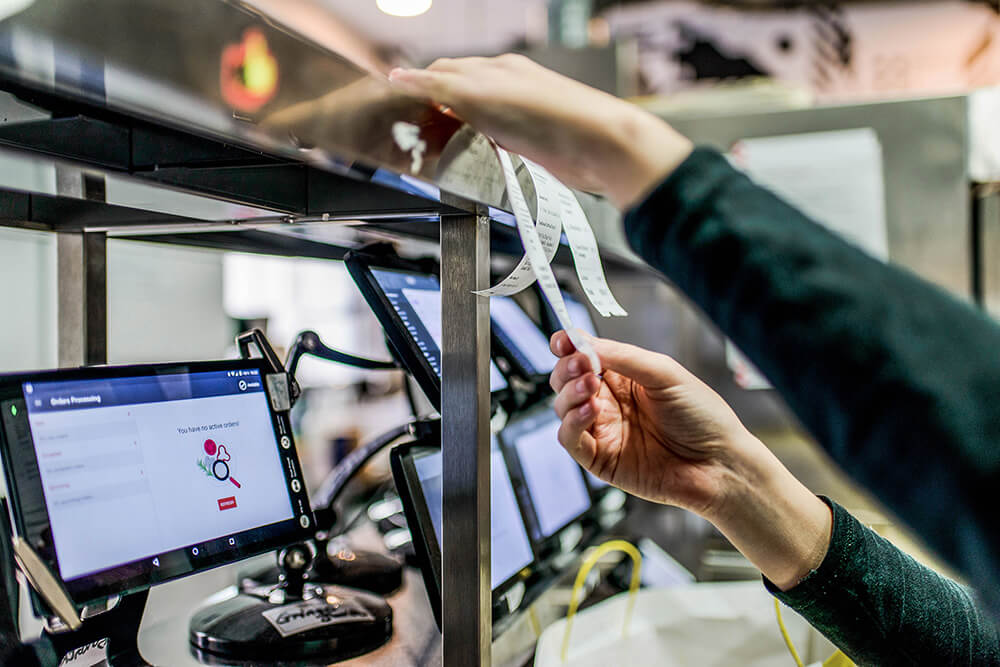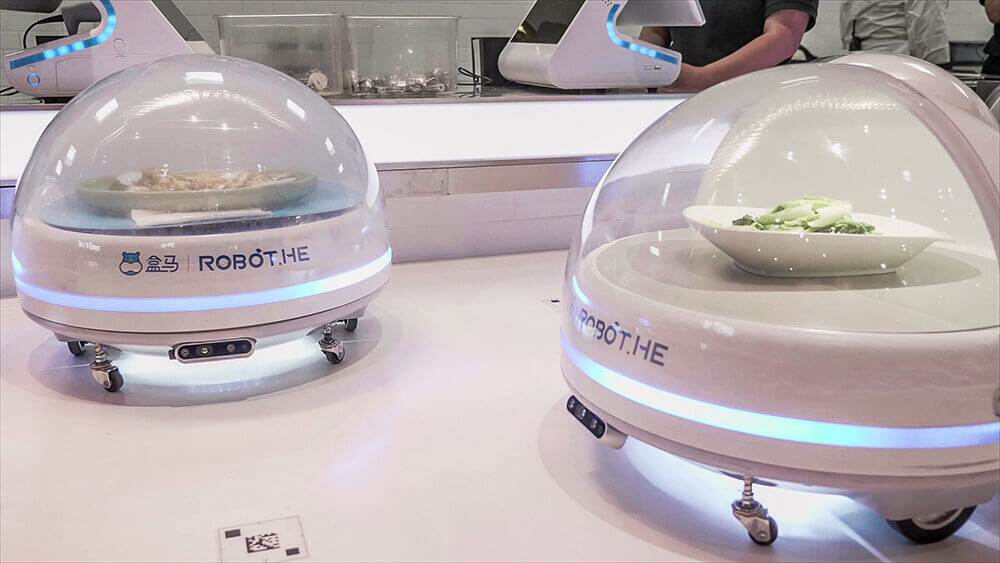1. Climate change pressure/demand for energy efficiency
2019 was the year of Extinction Rebellion, Greta Thunberg and global climate protests and that movement shows no sign of abating. Increased social awareness about waste and sustainability means a quick response will become a commercial as well as environmental imperative. “Determining how to react and build certain sensitivities into the culture of an operation will be the key,” says consultant Karen Malody FCSI, founder and CEO, Culinary Solutions.
2. Single-use plastics ban
In 2014 there were five trillion pieces of plastic floating in the world’s oceans, according to the Public Library of Science journal. Millennials and Generation Z-ers like on-demand food but hate plastic waste – putting restaurants on the frontline of change. Innovations like compostable packaging made serious headway in 2019 and will continue to do so over the coming year.

Image: panaramka-stock.adobe.com
3. Zero waste
From soil to stomach, wastage across the supply chain sees 1.3 billion tonnes of food thrown away every year. Are you making the most of your produce? Do you know your “use by” from your “best before?” Zero-waste restaurants are leading the charge for change – beloved by foodies, younger diners and good for the planet, it’s a business model that should go from strength to strength.
4. Shrinking commercial kitchen spaces
The commercial kitchen is evolving. Rents are ballooning, and sprawling back-of-house operations are hampering workflows and productivity. Enter the condensed kitchen: hoodless combi ovens, smaller prep areas and shrinking storage to accommodate on-demand cooking are all cutting the size of spaces while maintaining efficiency. 2020 will be the year of the designer.
5. Food delivery market boom
The global food delivery market is now worth over $100 billion and, if current rates of growth are sustained, it size will have almost doubled between 2017 and 2023. Growing market segments like click-and-collect and the titanic status it’s achieved in booming markets like China make delivery an engine of growth for the whole sector.
6. The rise (and rise) of ghost kitchens
Abandon those mental images of the first stop on a haunted house tour; “ghost” or “dark” kitchens are providing a foundation for the kind of on-demand, delivery-friendly cooking characterizing a new wave of consumer preferences. Rising costs are hampering restauranteurs’ ability to cater for consumers who want food delivered straight to their door; big players in the delivery sector are heavily investing in these off-site kitchens to meet new demand.

Image: Keatz
7. Casual dining slump to continue
One sector of the market isn’t looking quite so vibrant, and the indicators suggest decline in casual dining is set to continue. Growth is lagging behind the otherwise buoyant restaurant market in the US, while the closure of former high street heavy hitters like Jamie’s Italian in the UK was a bellwether. Pivoting towards the ever-expanding delivery market could be the route to salvation.
8. Big chains and ethics/politicisation of brands
“What a brand stands for is increasingly important,” says Jay Bandy, president of Goliath Consulting Group. “That’s going to continue to grow.” One of the big drivers of the delivery boom – increasingly financially independent younger generations – is also driving brands to take clear stances on topical issues around ethics and politics. There are opportunities here – but get it wrong and the consequences can be severe.
9. Supply chains pressure
Even household names can fall foul of hiccups in the supply chain. Limited distribution, friction between systems used, poor choice of distributor and human error can all contribute to preventable supply failings and, at worse, stock shortages for operators. We suggest heightened social awareness around waste and sustainability will put supply chains under scrutiny like never before in 2020. Now’s the time to check if yours is up to scratch.
10. Traceability and blockchain
And what’s the watchword for the supply chain of the future? Blockchain, of course. The technology’s ability to create traceable entries along a product’s lifecycle means it’s widely touted as a key to unlocking an overhaul in how operators approach food safety and provenance. Food rescue apps like Goodr are leading the way in its deployment to the industry.
11. Robotics, artificial intelligence and virtual reality
The future is now in foodservice, as long-touted advancements in data science and tailored dining start to be hammered into concrete form. Think 3D printing infiltrating commercial kitchens and the rise of predictive dining. “Operators can now project a sense of knowing the customer,” says Malody. 2020 will see the advantages of this make more headway than ever before in the wider market.

Image: Alibaba Group
12. Demographic change (ie. rise of Millennials/Gen Z)
The more one looks into the differences between Millennials (people born from the mid-80s to 1996) and their forebears, the clearer their importance becomes in driving change in the foodservice sector. Compared to Generation X consumers – those born between 1965 and 1985 – Millennials are less likely to go out to restaurants due to their preference for deliveries, demand automation in order and payment and are steering foodservice ever more towards sustainable, plant-based alternatives.
13. The industry goes cashless
If you live in a smaller town or rural area, the idea of a cashless restaurant may sound baffling. But, with the World Payments Report 2018 estimating a compound annual growth rate of 14% in non-cash transactions from 2017-2022, it could be on your doorstep sooner than you think. National chains – for example America’s Sweetgreen – are taking up the mantle, making it a key trend over the coming year.
14. Labor pressures and changing workforce
In a typical US restaurant “a third of the operating costs are labor,” according to Hudson Riehle, senior vice president of research at the National Restaurant Association, who also points out the industry sees sales per employee “substantially lower than other capital intensive industries.” Combine this with younger workers demanding a novel, flexible model of employment, and 2020 has the makings of a breakthrough year for the gig economy, with the old nine-to-five model on its way out.
15. Menus continue to be optimized and more focused
Data science provides “enormous potential for operators,” says Malody, but they must be “open to what the data is telling them – and willing to shift when needed.” As restaurants jostle for competition in a booming market, those providing a personalized offering have a clear advantage. Investments in the companies behind slimmer, predictive, proactive menus are now big money; this will only get bigger in 2020.
16. Cannabis boom
A compound annual growth rate of over 100%+ and a market value of nearly $300 billion – cannabis is big business. Its legal status remains patchy, but booming demand in American and Canadian provinces where cannabis is no longer criminal makes it a tempting proposition for entrepreneurs. The clamor for relaxed laws will grow in other countries such as the UK, and innovation will increase where chefs have been let off the leash.

Image: WindyNight – stock.adobe.com
17. Zero/low-alcohol beverages
Speaking of cannabis, there are a plethora of new beverages on the market aiming to ride the THC wave. But a more significant trend is the number of brewers eschewing psychoactive substances altogether. Although a small part of the market currently, commentators have noted storming growth in the zero/low alcohol beer sector. With low alcohol brewers now muscling their boozy competitors off the podium at awards shows, there’s a sure shift underway in the industry.
18. The meteoric rise of vegan cuisine/synthetic meat
Did you know the Impossible Burger now accounts for one third of all burger sales worldwide? Its meteoric rise is an emblem for the explosion of the global plant-based movement, whose ranks have been swollen by “flexitarians” enticed by the purported health and environmental benefits. All the signs point to Veganuary 2020 being the biggest yet.
19. New restaurant concepts (from veg-centric to fine-casual)
Speaking of the Impossible Burger and vegan juggernaut, such trends in dining are giving rise to a whole new generation of restaurants. Concepts like “vegan fast casual” would have sounded like an oxymoron only a few years ago, but the success of By CHLOE shows it’s not to be sniffed at. See also Sainsbury’s alcohol free pub pop up, reflecting the rise of such concept venues as a trend for 2020.
20. Experiential dining
Cheeseburgers by conveyor belt: not some Trumpian dream, but a recent example of the kind of “experiential dining” that big chains like McDonalds are using to coax cooped up Millennials out of their houses and into real restaurants. Experiential offerings will surely ramp up from restaurateurs anxious to remain what Riehle calls the community’s “social axis”.















